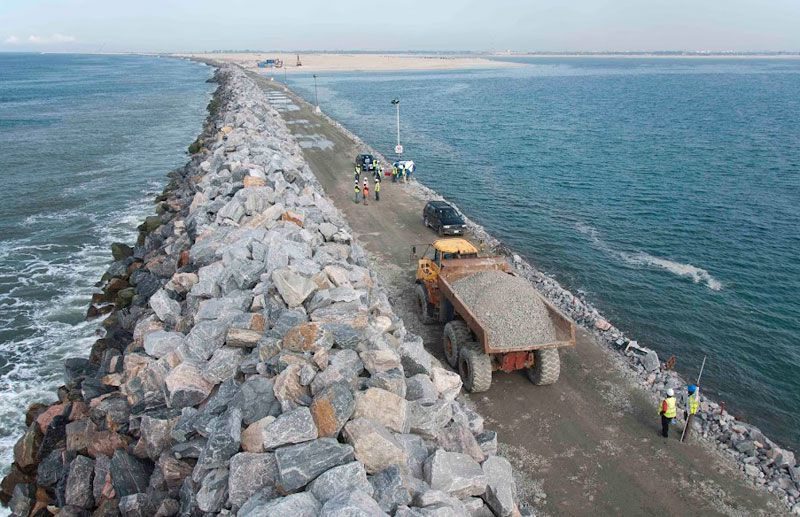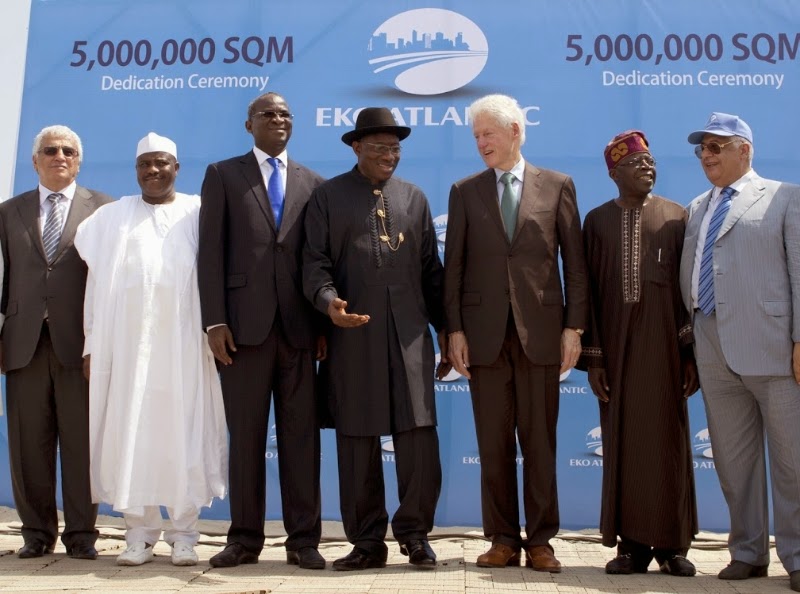The incessant flooding on the Lagos Island has gotten worse each year and this has been attributed to the Eko Atlantic City project. A project that is being developed by Lebanese businessman Gilbert Chagoury, a bonafide hustler who made his fortune during the Abacha era. The project was flagged off during the Fashola administration and has the blessing of Bola Tinubu, who is allegedly a silent partner in the project.
According to Mimi Onuoha, a Brooklyn based artist and researcher, the flaw in the construction of the Eko Atlantic City is responsible for the worsening flooding in Lagos city. A flood that just this rainy season has caused several casualties and billions of Naira in damages to property and infrastructure in the State.
In her report for Quartz, Mimi writes:
Eko Atlantic is the name of a grandiose project to create a new economic capital for Africa—notably, right next to the current economic capital for Africa. The development includes everything from sky-scrapers to luxury apartments, a new financial district, a private power-grid, and a shopping boulevard in the image of New York’s Fifth Avenue. It’s the brainchild of the Chagoury brothers, two Nigerian-born billionaires of Lebanese descent who own South Energyx Nigeria Ltd, a real estate development company created to build out Eko Atlantic.
Eko Atlantic is meant to be an antidote to Lagos’s deepest recession in 30 years. The city is meant to bring 250,000 new jobs and address a housing shortage brought on by a surging population. This, and the fact that it’s privately-funded, have lent it the support of the state and federal governments. It’s being sold to investors as “a valuable foothold in Africa” one of the world’s last emerging growth markets.
But what makes Eko Atlantic’s development especially noteworthy is its location. The planned city borders Lagos directly. Eko Atlantic was built by dredging up and filling in 10 kilometers (about 6.2 miles) worth of land. Before the project began in 2009, the peninsula was virtually non-existent.
The result is that Eko Atlantic has the appearance of being an island created out of thin air. Satellite imagery highlights just how dramatic an effect the construction — which is far from finished — has had on Lagos’ coast.
 Satellite imagery courtesy of DigitalGlobe.
Satellite imagery courtesy of DigitalGlobe.
The government of Lagos has programs in place to address coastal erosion because Lagos’ location leaves it deeply susceptible to rising sea levels and catastrophic storm surges. In 2012, a storm surge in the exact area of Eko Atlantic’s construction killed 16 people. In the aftermath of the tragedy (which some blamed on disturbances caused by Eko Atlantic’s building) the developers of the project highlighted the fabrication of “The Great Wall of Lagos,” a sea wall that wraps around the city and protects it from the effects of the surrounding Atlantic.
But according to some climate scientists, the same wall that will protect Eko Atlantic could worsen the situation for neighboring areas not protected by it, which includes much of Lagos. Dr. Alan Blumberg, renowned for his research and the effects of climate change on water structures, highlighted the challenges in a phone call.
“What happens when you build a wall is that the approaching storm surge will come up to the wall, and it will move to the left or right of the wall, searching for a weakness or a low spot. If there are two islands close to each other, it may go to the island next door instead.”

David Frame, Managing Director of South Energyx Ltd, said in a statement to Quartz, that the sea wall is designed and tested to handle the worst storms in hundreds/thousand years; “The Great Wall of Lagos will ensure that everyone living and working within the 10 square kilometres (6.2 miles) of reclaimed land for Eko Atlantic and the population of Victoria Island are protected from the sea.”
For Lagos, a city composed of a series of islands, if this is not the case, the situation Blumberg describes could be disastrous. Lagos’ surrounding areas are not only unprotected by the wall, but are lower in sea level than Eko Atlantic. It’s a combination that leaves the old city of Lagos and its hundreds of years of history startlingly vulnerable.
If the critics are correct, Eko Atlantic might provide parts of Lagos with yet another link to the sea, one rooted in potential danger and unknowable risk. To the sea parts of the city may return.

